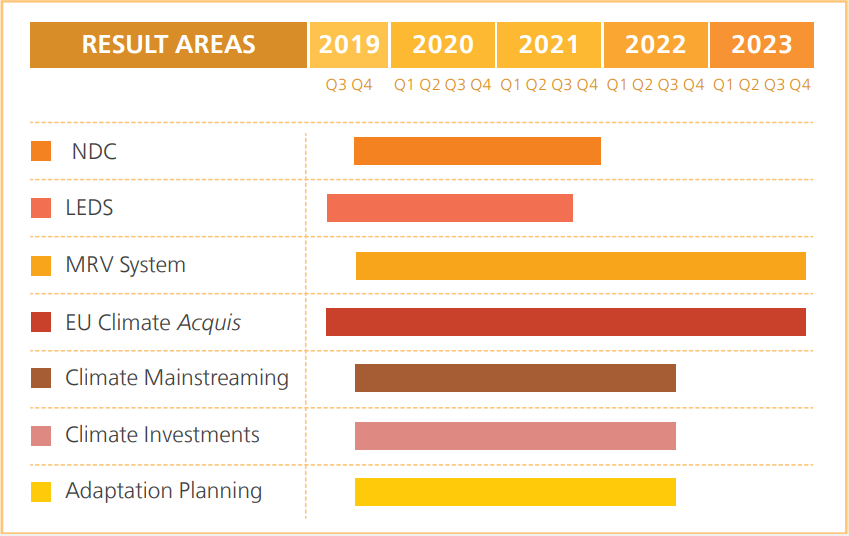
Climate policy development and advancing cooperation with the EU in Moldova

The EU-Moldova Association Agreement, including a Deep and Comprehensive Free Trade Area (AA/DCFTA), fully entered into force on 1 July 2016 after being applied – since September 2014. The Agreement significantly strengthens the political association and economic integration between Moldova and the EU. During the European Council on 23 June 2022, EU leaders granted EU candidate status to Moldova. With extensive support from the EU, Moldova is making gradual progress on the approximation of the EU environmental and energy legislation to ensure energy security and diversify supply sources, including renewable energy. The EU has supported climate change related actions in the transport sector as well, amongst others, by improving clean public transport in the largest cities and restructuring and modernizing the Moldovan railway sector. Moldova is moving forward on its low-carbon and climate resilient development pathway, with strong support from the EU and international financing institutions.
-
 2014
2014
- Association Agreement with the EU
- 3rd National Communication submitted to UNFCCC
- National Adaptation Strategy until 2020
 2015
2015
- Intended National Determined Contribution
(INDC) 2016-2030 - COP21 Paris Agreement
- Pledge to Sustainable Developent
Agenda 2030
- Intended National Determined Contribution
 2016
2016
- Biennial Update Report 1 (BUR) submitted to UNFCCC
- Adopted LEDS (2016-2030)
- Revised National Renewable Energy Action Plan
(NREAP) (2018-2020)
 2017
2017
- Low Emission Development Strategy (LEDS)
2030 entered into force - Ratification of Paris Agreement
- Third GHG Inventory submitted to UNFCCC
- Low Emission Development Strategy (LEDS)
 2018
2018
- Environment Agency set up
- 4rd National Communication submitted to UNFCCC
- National Measurement, Reporting and Verification
(MRV) System set up - BUR2 submitted to UNFCCC
 2019
2019
- EU4Climate launched
- 3rd National Energy Efficiency Action Plan (NEEAP) (2019-2021)
 2020
2020
- Updated NDC (2021-2030)
- NAP 2 launched
 2021
2021
- Draft updated LEDS 2030
- Enhanced Transparency Framework
- BUR3 submitted to UNFCCC
- Ministry of Environment set up
 2022
2022
- F-gases Law adopted
- National Development Strategy “European
Moldova 2030” adopted - MRV implementation capacity building
- Roadmap for Moldova alignment with climate acquis
 2023
2023
- Adoption of the Low Emission Development Programme
until 2030 and the Action Plan for its implementation - Adoption of the National Climate Change Adaptation
Programme (until 2030) and the Action Plan for its
implementation - F-gases Law adopted
- Climate law designed
- NECP designed
- 5th National Communication submitted to UNFCCC
- Drafted Climate Law Concept
- Ministry of Energy set up
- Adoption of the Low Emission Development Programme
EU4Climate key policy interventions and expected impact


EU4Climate in Moldova
Result areas and timeframe in Moldova
|
RESULT AREAS |
2019 |
2020 |
2021 |
2022 |
|||||||||||
|
|
Q3 |
Q4 |
Q1 |
Q2 |
Q3 |
Q4 |
Q1 |
Q2 |
Q3 |
Q4 |
Q1 |
Q2 |
Q3 |
Q4 |
|
|
NDC |
|
|
|
|
|
|
|
|
|||||||
|
Long-term LEDS |
|
|
|
|
|
|
|
|
|
|
|
|
|
|
|
|
MRV System |
|
|
|
|
|
|
|
|
|
|
|
|
|
|
|
|
EU Climate Acquis |
|
|
|
|
|
|
|
|
|
|
|
|
|
|
|
|
Climate mainstreaming |
|
|
|
|
|
|
|
|
|
|
|
|
|
|
|
|
Climate investment |
|
|
|
|
|
|
|
|
|
|
|
|
|
|
|
|
Adaptation planning |
|
|
|
|
|
|
|
|
|
|
|
|
|
|
|
Result areas and timeframe in Moldova

Full country profile can be downloaded here.






